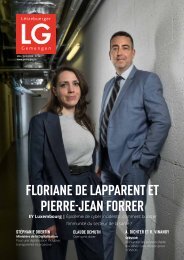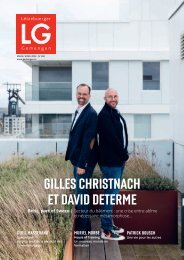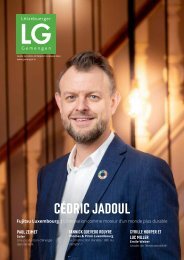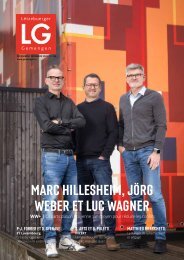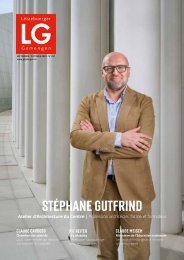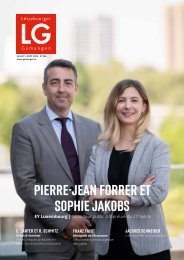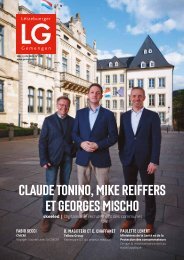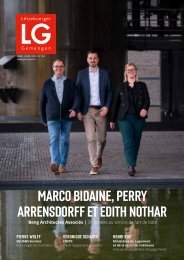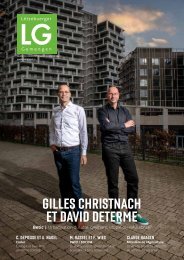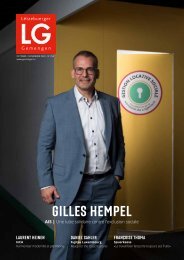LG 177
You also want an ePaper? Increase the reach of your titles
YUMPU automatically turns print PDFs into web optimized ePapers that Google loves.
Banque & finance<br />
More than 30 years of welcoming<br />
Islamic finance to Luxembourg<br />
During recent decades, Luxembourg has clearly demonstrated its ambition to become the<br />
Eurozone hub for Islamic finance and has put the right wheels in motion to encourage<br />
institutional investors who wish to serve Europe’s Muslim community.<br />
Global trends in Islamic Finance<br />
Islamic finance has grown into a global industry,<br />
with total assets of around USD 1.9 trillion. The<br />
Economist estimates that nearly 80% is entrusted<br />
either to Islamic banks or to the Islamic units<br />
of conventional banks, 15% to sukuks, 4% to<br />
Islamic investment funds and 1% to takaful, the<br />
Islamic version of insurance.<br />
Jean-Michel Pacaud, Partner at EY<br />
Luxembourg, explains: “We have not yet received<br />
the final figures of 2014, but in 2013 the<br />
global Islamic banking assets were at USD 1.7<br />
trillion. The estimate is that by the end of 2014<br />
the figure should be close to USD 1.9 trillion,<br />
representing an annual growth of 16 % since<br />
2008.”<br />
Islamic banks serve about 40 million clients globally,<br />
with the highest concentration in Saudi<br />
Arabia, Malaysia, Turkey and Indonesia.<br />
When asked about the driving factors behind<br />
this growth, Jean-Michel Pacaud explains that<br />
the authorities in high-growth emerging markets<br />
consider Islamic finance an effective way to<br />
build an inclusive financial system and to replace<br />
the shadow economy.<br />
S&P recently warned that global sukuk issuance<br />
could be hampered in 2015 by a slowdown in<br />
emerging markets as reduced confidence and<br />
low oil prices may hit investor demand.<br />
“It is still too early to analyse the consequences<br />
of the lower oil price. The countries that are<br />
strongly dependent on oil and gas might need<br />
to issue debt. This debt could be conventional<br />
or shariah compliant”, he says.<br />
Demand for sovereign sukuks is strong. “In<br />
today’senvironment of low interest rates, sukuks<br />
offerabetter return based on the type of assets.<br />
For example, in Luxembourgthe return is based<br />
on three government properties, the two towers<br />
of the Gate of Europe in Kirchberg and the<br />
Gutenberg building in Strassen. The rental<br />
income of the European Commission provides a<br />
stable and predictable return”, he adds. “Also,<br />
the majority of the state issuers from the region<br />
are in a much better financial situation than<br />
Western European countries. In other words, the<br />
credit risk to the issuers is perceived to be lower.”<br />
One financial centre, thousands of experts<br />
Islamic finance remains a fast growing industry<br />
that offers immense opportunities in need of a<br />
growing number of finance professionals that<br />
are acquainted with the specific services and<br />
products. Relying on its expertise in international<br />
finance, Luxembourg is well placed to further<br />
develop the platform of knowledge sharing for<br />
conventional and Islamic finance.<br />
“Luxembourg is the largest domicile for Islamic<br />
funds in Europe, and the third largest domicile for<br />
Islamic funds worldwide, after Malaysia and Saudi-<br />
Arabia”, explains Germain Birgen, Head of<br />
Business Development at Banque de Luxembourg.<br />
“Leveraging on the infrastructure and expertise in<br />
conventional finance, many service providers in<br />
Luxembourg started over ten years ago to add<br />
Islamic finance to their offering. More than 40<br />
Islamic investment funds have been created and<br />
are currently serviced by Luxembourg banks, fund<br />
administrators, legal and tax advisors and audited<br />
by international audit firms”, he continues.<br />
Adedicated committee within the fund administration<br />
body, ALFI, was created in 2007 to focus<br />
on the specific needs and expectations of Middle<br />
Eastern clients as well as fund managers active in<br />
Islamic finance. Representatives of various service<br />
providers based in the region second this<br />
committee.<br />
“ALFI is planning to publish an updated version<br />
of its ‘Collection of best practices in setting-up<br />
and servicing Islamic funds’. The intention is to<br />
continue attracting specialised fund managers to<br />
use the Luxembourg experience and existing<br />
market infrastructure to set-up and manage<br />
funds that can be distributed globally to both<br />
Muslim and non-Muslim investors”, points out<br />
Germain Birgen.<br />
2014: Luxemburg issues the first sovereign<br />
Euro-denominated sukuk<br />
For the third consecutive year, global sukuk<br />
issuance has exceeded the USD 100 billion threshold.<br />
2014 also saw new jurisdictions issuing<br />
sukuk,among which countries such as the United<br />
Kingdom, Hong Kong, South Africa, Senegal and<br />
Luxembourgwith its debut sovereign sukuk.<br />
The 200 million issue by Luxembour gwas the<br />
first sovereign sukuk issued in Euro and was<br />
more than twice over-subscribed.<br />
“The Luxembourg Stock Exchange listed 3 important<br />
sukuk issues in 2014, the Luxembourg and<br />
South African sovereign sukuks as well as the<br />
Goldman Sachs sukuk”, explains Germain Birgen.<br />
16<br />
<strong>LG</strong> - Juin 2015





